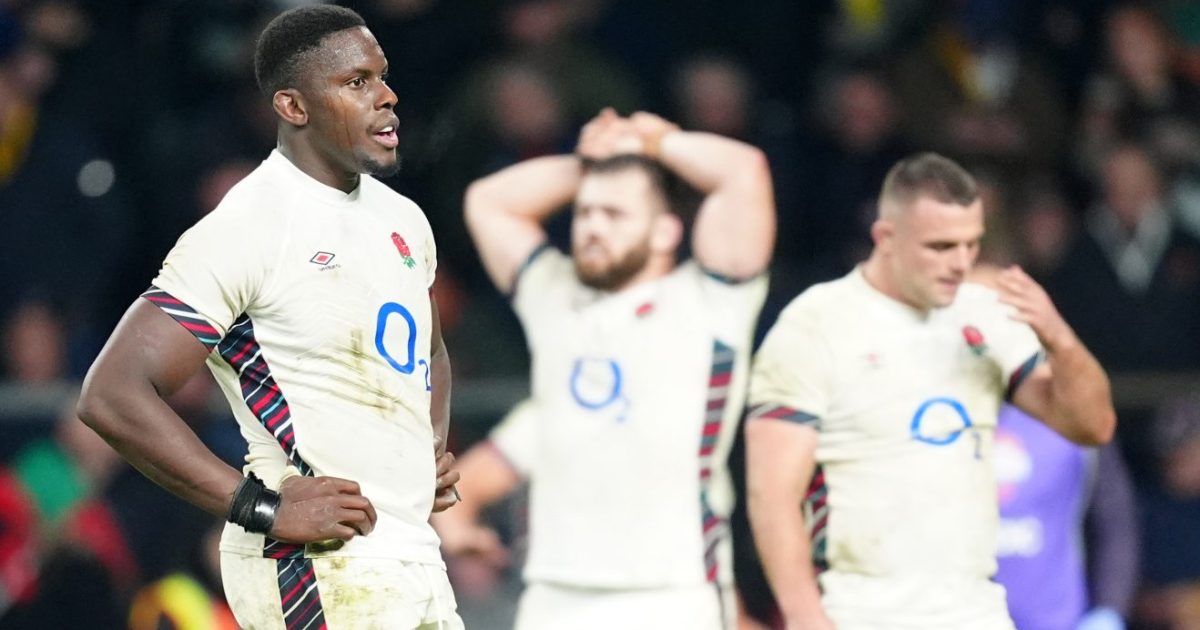'If we win the World Cup in 3 years, no one remembers the blitz not working'

England tighthead prop Dan Cole has said that the blitz defence is now part of England’s identity, but admitted that there will be some “pain along the way” as his side grow accustomed to it.
England’s porous defence has been subject to plenty of criticism this week, be it due to the 36 missed tackles or the way that Australia were able to manipulate it with ease on their way to beating Steve Borthwick’s side 37-42.
Cole addressed these flaws on his For the Love of Rugby podcast this week, where he joined Ben Youngs from the England camp ahead of their match against world champions South Africa on Saturday.
On the podcast, he explained how a high volume of missed tackles is expected with a blitz defence because teams are “going after people”.
The 117-cap England international also detailed where England went wrong at Twickenham’s Allianz Stadium after a promising start.
The Wallabies exposed some weaknesses in England’s defence around the breakdown, and were able to build momentum and speed of ball as a result. Cole explained how it is hard for a blitz defence to regain control in that situation, but highlighted how the Springboks would do so by putting in a dominant hit or slowing down a ruck.
Ultimately, the Leicester Tigers veteran echoed a point England have consistently made in 2024 that the blitz defence is a “long-term plan,” and one which he feels is suited to the direction that the game is going.
This plan of England’s has not been helped by its architect Felix Jones announcing his departure in the summer, and working remotely until his deal runs out. New defence coach Joe El-Abd is now implementing a defensive system he has inherited at short notice, meaning there will undoubtedly be further teething problems to a system that was still very green.
But, despite a wave of criticism this week, Cole has reiterated that England will stay committed to the blitz going forward.
“The likelihood is you’re going to miss more tackles in the blitz because it’s aggressive,” the 37-year-old said. “You’re going after people, you’re trying to force errorrs, you’re trying to make the opposition knock the ball on or lose the ball or make a dominant hit. So I think with missed tackles, if you just stuck 15 blokes in a flat line and get ran into a miss 35 tackles, that would be a different missed tackle to one where you’re actually trying to go forward and hit somebody as you do in the blitz defence.
“The success of the blitz defence relies upon getting a dead stop. So basically if someone runs as hard as possible you have to stop them on the gain line or near it and then the second man has to do a great job of either jackaling the ball to slow it down or blasting the breakdown, as you see a lot of teams do now, and trying to slow the release of that breakdown, like Ireland did the weekend to New Zealand. You blast the breakdown, you slow the release from the nine so therefore it gives your team a chance to get back in defensive line.
“You need to be to control the breakdown defensively and slow it down and that cycle of dominant hit, blast, all that kind of stuff which then allows you to blitz off the line which allows you get dominant tackles, which allows you to blast, which allows you to slow the ball down. You need to get that cycle right and then the blitz works.
“I think Australia were very good at the weekend. Angus Bell, nine defenders beaten, you beat a defender you get in behind, sometimes the defence is quite hard to then reestablish your authority or reestablish your control of the situation. We have to get better at that, England.
“The blitz, when you get it right, we’ve seen how successful it can be. It leads to try-scoring opportunities in defence, it leads to oppositions struggling to move the ball.
“At the weekend, people said ‘if you didn’t have a blitz, if you played you know if you played with soft feet it wouldn’t have happened.’ I still think Australia get around you if you’re short numbers on one side whether you run up the field or run backwards. Good attacks will find ways of beating defences.
“I’m sure people be going ‘oh why don’t England just do a drift defence or this, that or the other,’ but I think part of our identity as a team is trying to build on that defence and getting it as good as can be because I think that’s the way the game is going, you want a defence that can pressure the opposition and get turnovers, penalties and try-scoring opportunities. When it’s worked, you’ve seen it’s really good.
“I’ve said this all along, if you win the World Cup in three years time, no one really remembers the blitz not working against Australia at Twickenham. It’s a long-term plan and there’s going to be some pain along the way and you don’t want it but ultimately there’s one aim at the end of three years and you have to go through growing pains to get there. If you’re a better team and you learn from it, which we need to do admittedly, then you’ll get there.
“If you want to be an aggressive front-foot team, that is the defence that suits and that’s the way England will play for the next three, four, five years, that’s part of the identity.”




















